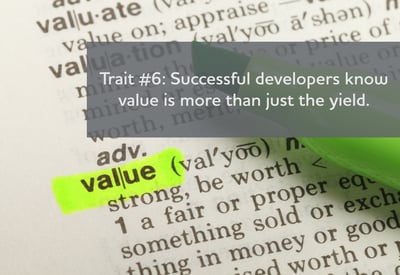 Developers often use the word “value.” Sometimes they’ll talk about creating value, and other times they’ll talk about extracting value. In land development, a project must add or provide value to be a success.
Developers often use the word “value.” Sometimes they’ll talk about creating value, and other times they’ll talk about extracting value. In land development, a project must add or provide value to be a success.
This seems so obvious, but many less-than-successful developers skip the critical step of defining the value they intend to redeem. In turn their consulting teams assume what value the developer wants to achieve. This circle of ignorance can and does lead to confusion, wasted time and resources, mismatched relationships, and projects that don’t optimize the value the developer wanted.
Yield is the most simple and commonly used definition of value in Land Development and therefore the most common unspoken value. We’ve all heard the expectation, “Get as many lots as possible!” or “Squeeze as much square footage and stalls as you can!” Yes, I guess this is helpful. About as helpful as make sure you eat enough today or remember to fill the gas tank all the way up. Just because parcel yield is the most obvious metric doesn’t mean it’s the only metric, or even the most important. Successful Developers understand that value is so much more than that.
Trait #6: Successful developers know value is more than just the yield.
Value in land development is multi-dimensional. The list for the dimensions of value can be long but for this post I will keep it high level. The best developers I’ve worked with keep six metrics at the core of their definition of value. In the spirit of definitions, let’s define these six metrics based on the mythical Developer’s Dictionary:
Yield (n) \’yēld\: The number of lots or units. The amount of rentable space and parking. How much you get out.
Cost (n) \’kŏst\: The amount of money necessary to deliver to market, including for land acquisition, construction, entitlement, etc. How much you put in.
Velocity (n) \və-‘lä-sə-tē\: The time it takes to entitle, construct, sell, rent, leverage, etc. How fast it moves.
Brand (n) \’brand\: The image and perception the developer intends to cultivate with the bank, buyer, renter, neighbors, agency, community, etc. How it makes you look when it’s done.
Market (n) \’mär-kət\: The group of potential clients a developer targets, often based on specific common characteristics. The project must respond to the target market’s demand. Your buyers.
Ethos (n) \’ē-thäs\: The values, character, or purpose of the developer. How it makes you feel about yourself and the legacy of your work.
Beyond a simple definition, the Ethos dimension often increases its dominance in the great and chronically successful developer’s value equation. Eventually most successful developers engage in development not just to keep making money but also because it’s meaningful work that is fun and personally rewarding. You have to want to take the risks that development always presents. For consistently successful developers, Ethos is the X-Factor that eventually becomes non-negotiable.
These metrics of value are often tradeoffs to one another, and each project often necessitates a new balanced equation of value based on unique situational factors. To articulate how these dimensions pull against one another, here is a series of questions that the best developers contemplate before charging ahead:
- Would fewer units that lease faster be better than more units?
- Does this project hope to capture move-up buyers from my previous adjacent project and do those buyers expect a certain historic level of quality from my projects?
- Is a project with fewer lots (and no special approvals) that is approved quicker better than the perfect planned unit development that takes six more months to get to construction?
- Am I willing to spend more per lot to get more lots or live with less units with lower construction cost and a better margin?
- Am I committed to selling this project when complete or holding it for income property over time?
- Will I be proud of the finished product and willing to drive my family by and show it to them?
- Beyond making a return, will this project elevate, maintain, or erode my brand in this market?
- Am I willing to compromise my vision of the project to maintain or improve the return?
So for instance, if the Cost of a project is very high, a developer may be more inclined to focus on Yield or Velocity above all else. Likewise, if Ethos is a high priority, Market and Brand will likely become more important as well. In my experience, successful developers are more inclined to the latter.
These are my observations about the complexity of defining value beyond just yield and how I have seen the best developers approach it. I have had the good fortune to work for and with some great and successful land developers. I learn something new every time I get the opportunity to work with great developers, and I hope that as I pass these lessons on that you will benefit from them as well.
How do you define value for your projects? Are there any other metrics that should be added to this list? I’m interested in your feedback!
Read the entire Eight Traits of Successful Developers Series HERE.

